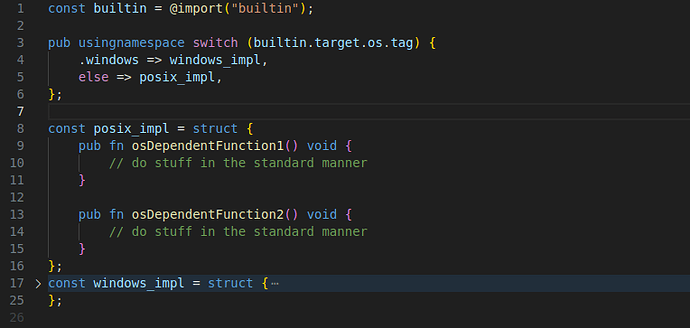Good day!
I’m looking for help with detecting the operating system in Zig. Specifically, I’m trying to replicate the behavior of the following C code:
const char* os_dependent_function() {
#if defined(__FreeBSD__)
return "string1";
#else
return "string2";
#endif
}
Thanks in advance.
alp
September 9, 2024, 11:55pm
2
You have some options:
const builtin = @import("builtin");
// Top level constants are always comptime
const val = if (builtin.target.os.tag == .freebsd) "string1" else "string2";
pub fn func() []const u8 {
return val;
}
// Or you can assert that an if condition happens at comptime
pub fn func() []const u8 {
if (comptime builtin.target.os.tag == .freebsd) {
return "string1";
} else {
return "string2";
}
}
6 Likes
The usingnamespace
pub usingnamespace switch (builtin.target.os.tag) {
.windows => windows_impl,
else => posix_impl,
};
const posix_impl = struct {
pub fn osDependentFunction1() void {
// do stuff in the standard manner
}
pub fn osDependentFunction2() void {
// do stuff in the standard manner
}
};
const windows_impl = struct {
pub fn osDependentFunction1() void {
// do stuff Microsoft's way
}
pub fn osDependentFunction2() void {
// do stuff Microsoft's way
}
};
1 Like
Please don’t use usingnamespace it might get removed in the near future: Remove `usingnamespace` · Issue #20663 · ziglang/zig · GitHub .
see the link for better alternatives including the usecase discussed here.
1 Like
I don’t agree with the proposal, because it makes the language less ergonomic. The nice thing usingnamespace is that it allows you to quickly collapse a section:
The proposed alternative is definitely not better in this regard.
2 Likes
If the platform specific implementation is getting too big, you can put it in a separate file as I have done here: Less basic fuzzer by ProkopRandacek · Pull Request #21246 · ziglang/zig · GitHub
1 Like
